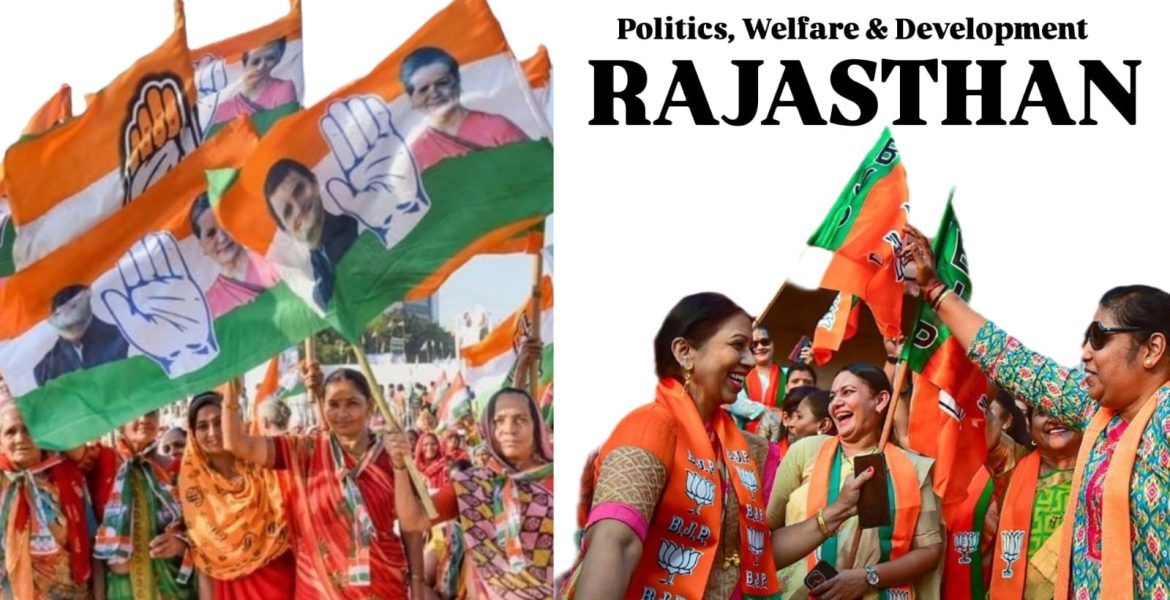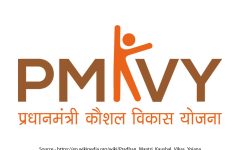A Decadal Look at the Political Evolution in Rajasthan: Shifts and Challenges in Welfare and Development (2013-2024)
April 21, 2025 2025-04-21 5:12A Decadal Look at the Political Evolution in Rajasthan: Shifts and Challenges in Welfare and Development (2013-2024)

A Decadal Look at the Political Evolution in Rajasthan: Shifts and Challenges in Welfare and Development (2013-2024)
By Nitisha Lal
Source: Hindustan Times, and the Mint.
The state of Rajasthan, known for its rich cultural heritage and diverse landscape has witnessed notable changes over the last decade in governance under the Bhartiya Janta Party (BJP) and Indian National Congress (INC). As the state alternated between these two political parties forming the government, each brought unique approach to development, taking India’s largest state by area to new heights.
The people of the state voted BJP into power in 2013, choosing Mrs. Vasundhara Raje as the Chief Minister for the state from 2013-18. The Raje government prioritized infrastructure development and business-friendly policies in Rajasthan to boost trade and economic growth. This was the period during which the state emerged as a leader in solar energy production, making remarkable achievements in the renewable energy sector. Along with this, several initiatives were launched to promote tourism and industrial development, which began to attract investments. Additionally, law and order were also focused upon and monitored to enhance investor confidence. The BJP-government under the leadership of Raje implemented welfare schemes such as the Mukhymantri Rajshri Yojna, which targeted to promote maternal health, and the Bhamashah Yojana, which was a direct cash-transfer program designed to empower women through economic resource.
However, the political pendulum swung back to Congress in 2018, bringing Mr. Ashok Gehlot to power. The shift in government and the party led to significant re-direction of policy priorities, with the government placing greater emphasis on social welfare and rural development. The Congress-government also focused more upon farmer’s concerns. The tenure of the government coincided with the COVID-19 pandemic, necessitating a renewed focus on healthcare assistance, improved infrastructure, and economic recovery. Following this the Chiranjeevi Health Insurance Scheme was introduced in 2021, demonstrating a commitment to making healthcare more accessible to the poor.
Over the years, irrespective of the government, the prevalence of welfare politics has one way or another often overshadowed the development of a robust welfare state. Both the major parties have heavily relied on populist measures and social-welfare schemes to strengthen and expand their existing vote-bank. While most of the initiatives provide relief to the target populations, these are often temporary, falling short of addressing structural issues requiring long-term action and well-planned systematic solutions for crucial areas like education, unemployment, and poverty. Hence, the focus on politically advantageous, short-term relief measures has many a times hindered the development of strong institutional frameworks for sustainable progress in the state.
Nevertheless, some of the initiatives have shown promising results, one of them being the solar energy development, which stands as a proof of successful policy implementation. Similarly, other policies focusing on healthcare, employment like NREGA, have provided crucial support to the vulnerable population in the state. The infrastructural development, including improvements in highways and rural electrification also contributed positively to the state’s development narrative. However, significant challenges exist in the form of unemployment of the youth, water scarcity and inadequate irrigation infrastructure hampering the productivity of agricultural sector and growth of the farmers.
As Rajasthan looks forward to the future with massive heritage restoration, establishing a stronger stance as a tourist destination. It requires focused attention towards balancing industrial development that could have significant impact on the environment, along with agricultural productivity. Additionally, it also needs to balance creating employment opportunities for the youth while supporting the traditional artisans and craftsmen. The disconnect between policy proposals actual implementation also needs to be addressed through improved governance mechanisms and transparency. The agriculture sector requires comprehensive solutions for water scarcity, irrigation infrastructure, and fair crop prices to support the farming community.
Looking ahead, Rajasthan must pivot from short-lived welfare politics toward building a solid welfare state capable of tackling systemic issues and promoting lasting development. This shift calls for strong political will, administrative efficiency, and—most importantly—a long-term vision that goes beyond party agendas and election cycles. Ultimately, Rajasthan’s progress will depend on how future leaders balance immediate needs with the pursuit of sustainable solutions that truly benefit its people.
References
- Indian Express. (2023, October 20). A political history of Rajasthan: A Congress-BJP revolving door. Retrieved from https://indianexpress.com/article/explained/explained-politics/a-political-history-of-rajasthan-a-congress-bjp-revolving-door-9038524/
- Business Standard. (2024, November 12). Rajasthan’s tourism industry seeks a dedicated board in new policy. Retrieved from https://www.business-standard.com/india-news/rajasthan-s-tourism-industry-seeks-a-dedicated-board-in-new-policy-124111201427_1.html
- The Hindu. (2023, August 15). Rajasthan set to emerge as hub of solar power components with changes in renewable energy policy. Retrieved from https://www.thehindu.com/news/national/rajasthan/rajasthan-set-to-emerge-as-hub-of-solar-power-components-with-changes-in-renewable-energy-policy/article68385523.ece






